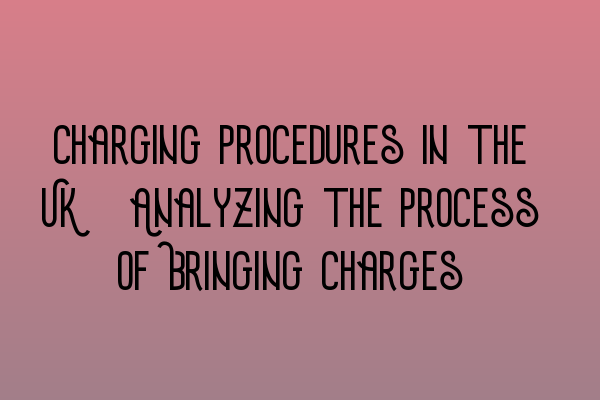Charging Procedures in the UK: Analyzing the Process of Bringing Charges
Welcome to the official blog of SQE Criminal Law & Practice UK. In this article, we will dive deep into the charging procedures in the UK, analyzing the process of bringing charges and providing you with valuable insights. Before we begin, don’t forget to check out our related articles:
- SQE 1 Practice Exam Questions
- SQE 1 Practice Mocks FLK1 FLK2
- SQE 2 Preparation Courses
- SQE 1 Preparation Courses
- SRA SQE Exam Dates
Understanding the Charging Process
In the current legal landscape, it is essential to have a thorough understanding of charging procedures in criminal cases. The process of bringing charges involves multiple steps and plays a crucial role in determining the course of legal action. To ensure a fair and efficient criminal justice system, it is important for both legal professionals and the general public to comprehend this process.
The charging process begins with the gathering of evidence by law enforcement authorities. Once the evidence is collected, it is reviewed by prosecuting agencies, such as the Crown Prosecution Service (CPS) in England and Wales. The CPS evaluates the evidence against the legal criteria for prosecution, including sufficiency of evidence and public interest.
If the evidence meets the criteria for prosecution, the CPS can then decide to bring charges against the alleged offender. The decision to charge is based on factors such as the seriousness of the offense, the availability of evidence, and the likelihood of securing a conviction. It is crucial for the CPS to exercise discretion and assess each case individually.
Once charges are brought, the case proceeds to the court system. Depending on the seriousness of the offense, the case may be heard in either the Magistrates’ Court or the Crown Court. The defendant is formally informed of the charges against them and has the opportunity to enter a plea.
In cases where the defendant pleads guilty, the court proceeds to sentencing. However, if the defendant pleads not guilty, the case moves forward to trial. During the trial, both the prosecution and the defense present their evidence and arguments. The court then determines the defendant’s guilt or innocence based on the evidence presented.
It is important to note that the burden of proof lies with the prosecution. The standard of proof in criminal cases is beyond reasonable doubt, meaning that the court must be convinced of the defendant’s guilt to a high degree of certainty. If the court finds the defendant guilty, they will be sentenced accordingly.
The Role of Legal Professionals in the Charging Process
Legal professionals, such as solicitors and barristers, play a crucial role in the charging process. Solicitors are often the first point of contact for individuals who are under investigation or have been arrested. They provide legal advice, represent clients during police interviews, and assist in navigating the complexities of the legal system.
Barristers, on the other hand, are specialist advocates who represent clients in court. They work closely with solicitors to prepare the case, provide legal expertise, and present arguments before the court. Barristers are instrumental in ensuring that the defendant’s rights are protected and that a fair trial takes place.
Conclusion
In summary, understanding the charging procedures in the UK is essential for legal professionals and the general public alike. The process of bringing charges involves multiple stages, including evidence gathering, review by prosecuting agencies, charging decisions, court proceedings, and sentencing. Legal professionals, such as solicitors and barristers, play a crucial role in guiding individuals through this complex process.
For more information on SQE preparation, take a look at our SQE 1 Preparation Courses and SQE 2 Preparation Courses. Stay updated on the latest SRA SQE Exam Dates by visiting our SRA SQE Exam Dates page.
Make sure to test your knowledge with our SQE 1 Practice Exam Questions and practice mocks such as SQE 1 Practice Mocks FLK1 FLK2. We hope this article has provided valuable insights into the charging procedures in the UK.
